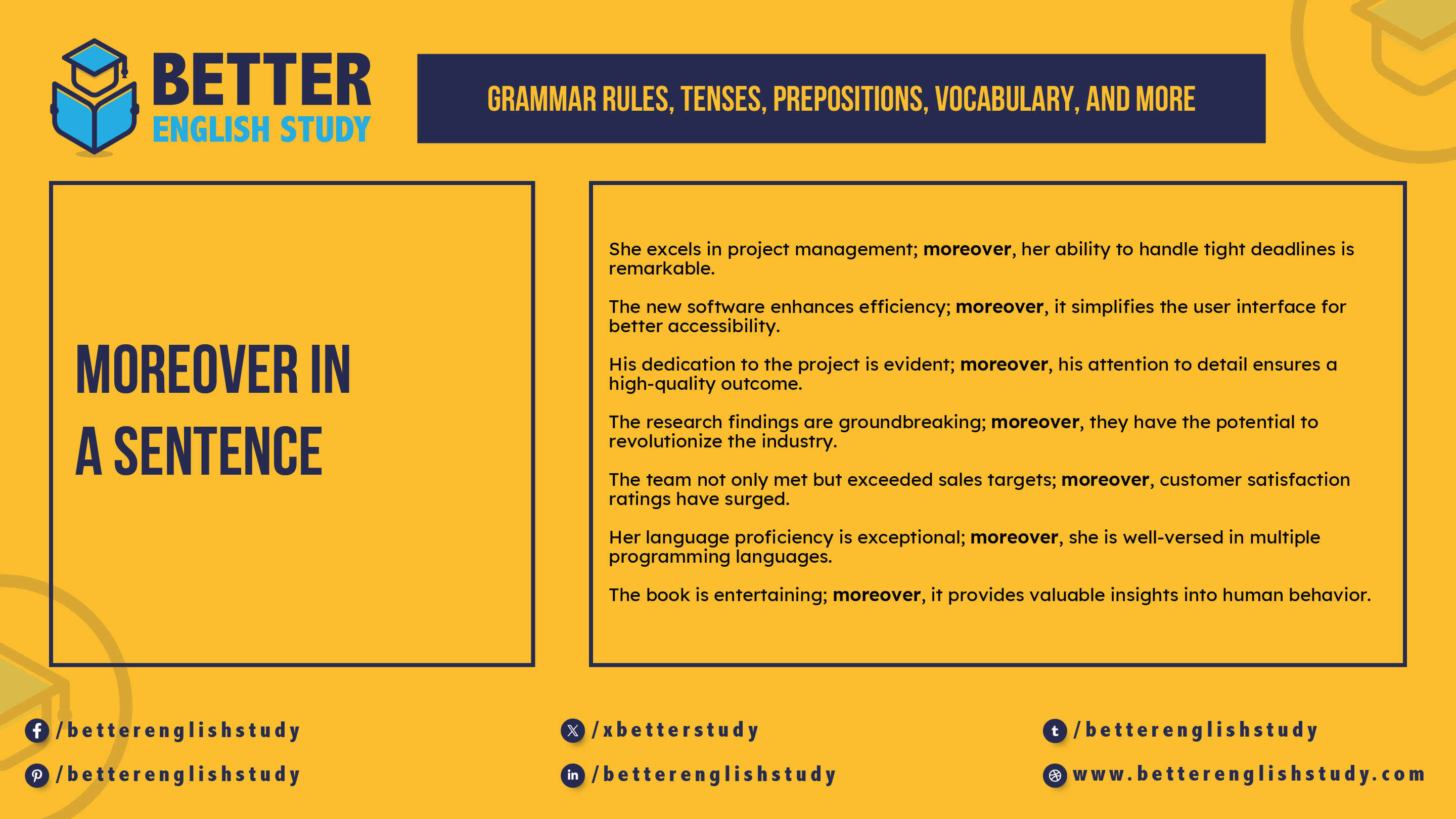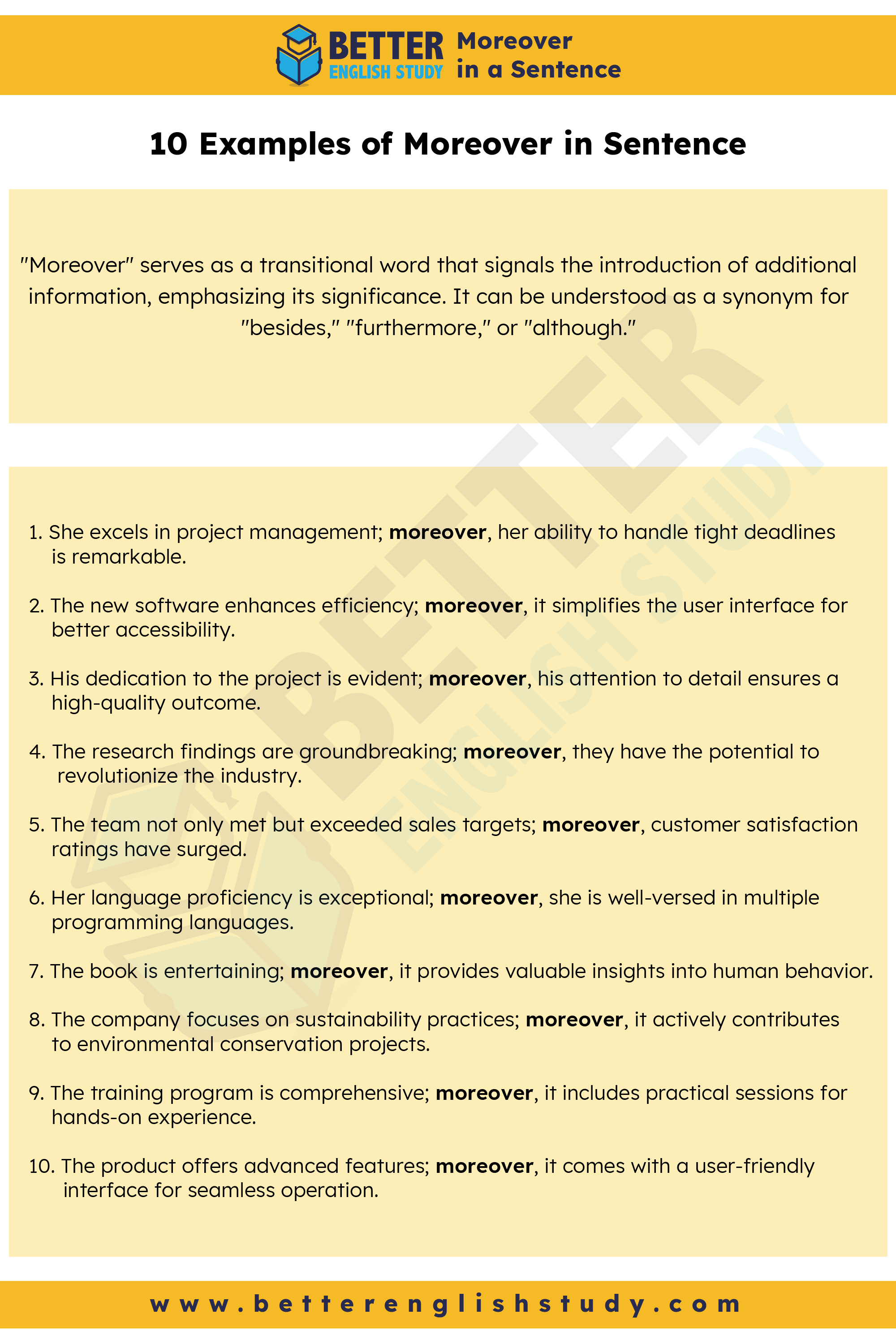
Effective communication involves selecting the right words and employing them strategically to enhance coherence and clarity. “Moreover” is a valuable term that can elevate your writing and speech by indicating additional information or supporting evidence.
In this article, we will explore the meaning of “moreover,” how to use it in a sentence, and provide examples to illustrate its usage.
Moreover Meaning
“Moreover” serves as a transitional word that signals the introduction of additional information, emphasizing its significance. It can be understood as a synonym for “besides,” “furthermore,” or “although.” Let’s delve into its meaning through various examples:
Examples:
- She is an excellent team player; moreover, her leadership skills are commendable.
In this example, “moreover” introduces additional information about the person’s commendable leadership skills.
- The project was not only completed ahead of schedule but was also executed with high precision; moreover, it received positive feedback from clients.
Here, “moreover” emphasizes the positive feedback received from clients as an added point of significance.
- He has extensive experience in marketing; moreover, he possesses excellent analytical skills.
The word “moreover” emphasizes the possession of excellent analytical skills and the person’s marketing experience.
How to Use Moreover in a Sentence
To use “moreover” in a sentence, place it at the beginning or within a sentence to introduce additional information or provide further support for a statement. It acts as a bridge between ideas, indicating a progression or continuation of thought.
Moreover in Sentence Examples
- She excels in project management; moreover, her ability to handle tight deadlines is remarkable.
- The new software enhances efficiency; moreover, it simplifies the user interface for better accessibility.
- His dedication to the project is evident; moreover, his attention to detail ensures a high-quality outcome.
- The research findings are groundbreaking; moreover, they have the potential to revolutionize the industry.
- The team not only met but exceeded sales targets; moreover, customer satisfaction ratings have surged.
- Her language proficiency is exceptional; moreover, she is well-versed in multiple programming languages.
- The book is entertaining; moreover, it provides valuable insights into human behavior.
- The company focuses on sustainability practices; moreover, it actively contributes to environmental conservation projects.
- The training program is comprehensive; moreover, it includes practical sessions for hands-on experience.
- The product offers advanced features; moreover, it comes with a user-friendly interface for seamless operation.
What is a Synonym for Moreover?
Synonyms for “moreover” include “besides,” “furthermore,” and “although.” Let’s explore these alternatives with examples:
Examples:
- She is proficient in multiple languages; besides, she has a background in international relations.
- The project is progressing smoothly; furthermore, the team is ahead of schedule.
- His dedication to work is admirable, although he occasionally faces challenging tasks.
Can I Use Moreover to Start a Sentence?
Yes, “moreover” can be used to start a sentence. Here are examples:
Examples:
- Moreover, the research findings indicate a significant breakthrough in medical science.
- Moreover, the team’s collaborative efforts resulted in a successful product launch.

Is Moreover a Good Word to Use?
Yes, “moreover” is an excellent word, especially when you want to emphasize additional information or support a statement. It enhances the flow of your writing and adds a layer of sophistication to your language.
Examples:
- The new software is user-friendly; moreover, it has advanced security features.
- She has excellent communication skills; moreover, she is a strategic thinker.
What is the Difference Between Furthermore and Moreover?
“Furthermore” and “moreover” are often used interchangeably, but subtle differences exist. While both signal the addition of information, “furthermore” is typically used to add a point that aligns closely with the preceding information. Let’s explore the difference:
Examples:
- The team is highly motivated; furthermore, they have a track record of achieving targets.
Here, “furthermore” adds a closely related point about the team’s track record.
- The product is innovative; moreover, it has received positive reviews from industry experts.
In this case, “moreover” emphasizes the positive reviews as an additional point of significance.
Is Moreover Positive or Negative?
“Moreover” is generally neutral and does not carry a positive or negative connotation. It is used to indicate additional information without implying a specific judgment.
Examples:
- The project is progressing well; moreover, the team has identified areas for improvement.
- The company has a strong market presence; moreover, it faces increasing competition.
What is the Difference Between Moreover and Nevertheless?
“Moreover” and “nevertheless” serve different purposes. “Moreover” is used to introduce additional information or support for a statement, while “nevertheless” is used to indicate contrast or contradiction. Let’s explore the difference:
Examples:
- The product is reliable; moreover, it comes with a comprehensive warranty.
Here, “moreover” adds information supporting the reliability of the product.
- The weather forecast predicts rain; nevertheless, the outdoor event will proceed as planned.
In this instance, “nevertheless” introduces a contrasting point that the outdoor event will proceed despite the predicted rain.
In conclusion, “moreover” is a versatile term that enriches your language by indicating additional information or supporting a statement. By understanding its meaning, usage, and nuances, you can incorporate “moreover” effectively to enhance the coherence and depth of your writing and speech.
